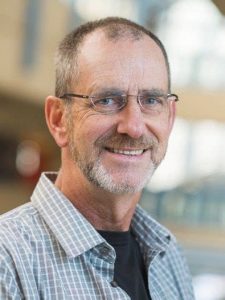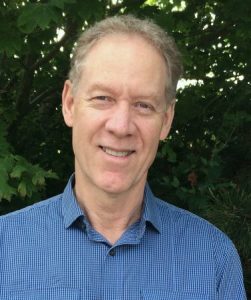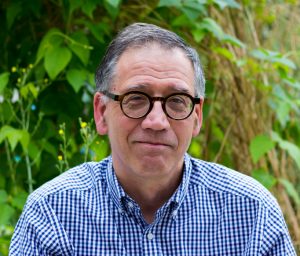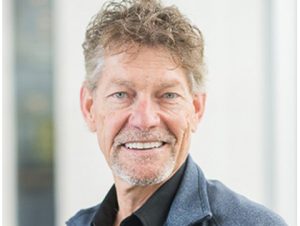Meet Professor Jerry Wasserman: Living a ‘parallel career’
It’s not every day you get home from a long day at school, flop on the couch, flip on the TV, and see your prof.
But that happens all the time for Theatre and English Professor Jerry Wasserman’s students. They’re just as likely to catch him in an episode of The X-Files, or Battlestar Galactica — or on the silver screen — as they are to see him in class.
Ever since he moved to Vancouver from his hometown New York City in 1972, Wasserman has been living out what he calls his “parallel career.”
By day, he’s a prize-winning professor and a respected academic. The rest of the time, he’s hard at play in “Hollywood North,” Vancouver’s booming film industry, where he’s got more than 200 acting credits to his name. “It’s been great having this dual life,” Wasserman says, beaming his megawatt smile. “I’m the luckiest person I know.”
Sure, his work as an actor has seen him consort with celebrities like Will Smith and Ethan Hawke, but he’s adamant that teaching is no bit part in his career.“I love teaching,” he says. “At best, it’s this kind of ridiculously ideal job where you get to talk about interesting things to interested and interesting people. And someone pays you for it? I mean, what could be better than that?”
The classroom, to his mind, is a kind of stage in its own right — especially when it comes to Monday morning survey courses, where students fight to keep their eyelids open. “I figure it’s my job that a) the students stay awake, and b) they stay engaged,” Wasserman says. “And that’s an actor’s skill.”
Acting skills he has in spades, but he says the class-as-theatre analogy has its limits. “There’s a fine line between upstaging your material and utilizing those skills to maximize students’ engagement with the subject at hand.”
It seems to be working — UBC honoured Wasserman with a Killam Teaching Prize in 1998 and the Dorothy Somerset Award in Performance and Development in Visual and Performing Arts in 2005.
Trained as a 20th Century English and dramatic literature specialist at Cornell University, Wasserman became deeply involved in that university’s theatre scene. When he came to Vancouver to teach canonical British writers like Beckett, Woolf, and Conrad in the Department of English, he soon started acting and lecturing on Canadian theatre. “The field of Canadian drama studies was wide open, it was literally brand-new,” says Wasserman, who recalls that at the time he was literally able to read every play ever published in Canada. “I came in right on the ground-floor of a new discipline.”
He became a leading expert in the field, publishing among other things the book Modern Canadian Plays (Talonbooks: 1985), an anthology that has since become the major textbook in the field.
Extremely thankful to work at a university that has supported his double life, Wasserman equally credits lady luck for allowing him to be in the right place at the right time.
“I wake up in the morning sometimes and I have to pinch myself, you know, because I’m living the dream.”
Meet Professor Tina Loo: Following suit to make a difference
In some ways, Professor Tina Loo wants to be the Al Gore of the history department.
“He’s a masterful teacher,” says Loo, who saw the former U.S. vice-president deliver his history-making slideshow in Calgary in 2007. “It’s not everybody who can speak for two-and-a-half hours about a bunch of really boring atmospheric science and make it seem interesting and be full of passion,” she adds.
Loo was impressed by how Gore handled a tough crowd: an auditorium filled with oil barons and top politicians in a province quickly becoming Canada’s biggest carbon producer.
Both Al Gore and his award-winning film An Inconvenient Truth (2006) figure in a first-year course on global warming that Loo, an environmental history expert, will teach this fall from the Dept. of History. Called “History 105: The Global Environment,” the course explores, among other things, why Gore received a standing ovation at the end of his Calgary presentation — a surprising finale for many. “Environmental issues are really shaping political engagement,” says Loo, who believes the current climate change debate is politicizing people beyond the existing categories of left and right.
By exploring that shift with students, Loo hopes to “get beyond the paralysis of that all of us seem to feel on the issue” of global warming.
That approach to a troubling topic echoes her work on other themes. As the Canada Research Chair in Environmental History, Loo studies how government policies and social discourses impacted the environment in 19 and 20th century Canada.
Loo specializes in uncovering how past rationales have led to modern environmental dilemmas. Her research has focused the era of mega-projects and hydroelectric dams in BC, as well as Canada’s history of wildlife management, both subjects on which she has authored numerous books and articles. In her work on state power projects, for example, she explored how governments banked on public optimism and confidence in the state in the 1950s through 1970s. The belief that damming rivers for electricity could result in a better society for everyone helped shape the provincial landscape we know today, she says.
“That was a very particular historical moment that to a certain extent has passed,” she explains, adding that she thinks people now are quite cynical of the ability of government and suspicious of the notion of experts. “Partly because expertise has got us into a lot of trouble,” she says. “Science has not necessarily resulted in the better world that people hoped for.”
Loo’s work with First Nations has tried to show how emotional and anecdotal experiences of environmental change are just as important as the official research carried out by government scientists.
If there’s one thing she’s gleaned from her work digging through archives — which she likens to “an Indiana Jones experience” — it’s that individuals and local groups can impact outcomes, including global warming.
“I think that history tells you that things aren’t inevitable, and they could have been different,” she says.
By Bryan Zandberg (BA ’06), former editor with The Ubyssey.
Alumni Stan Persky wins Lieutenant Governor’s Award for Literary Excellence
Born in Chicago, Persky immigrated to Vancouver in the 1966. UBC BA’69 (Anthropology) MA ’79 (Sociology), Persky has been a media commentator for CBC and literary columnist for the Vancouver Sun, the Globe and Mail, This Magazine, Saturday Night and The Tyee. Persky also regularly contributes articles and reviews to Dooneys Cafe and his personal website, splitting his time between Vancouver and Berlin.
Persky is a Philosophy instructor at Capilano University and author of 20 books, including Fantasy Government: Bill Vander Zalm and the Future of Social Credit, The Short Version, At The Lenin Shipyard: Poland and the Rise of the Solidarity Trade Union and Buddy’s: Meditations on Desire. He co-founded the Georgia Straight Writing Supplements which led to the establishment of the Vancouver publishing house New Star Books.
“We have chosen Stan Persky as the recipient of the 2010 Lieutenant Governor’s Award for Literary Excellence because of the intellectual and moral integrity he brings to his work as a writer who engages with some of the most difficult questions facing society, and because of the great contributions he has made to the literary canon of Canada and British Columbia.
His numerous books and his trail-blazing efforts in creating literary journals and a forum for public engagement – not least New Star Books and the Georgia Straight – have helped develop British Columbia’s literary community into what it is today. His grace as an essayist, his curiosity and independence of thought as a critic and newspaper columnist, and his exuberance as a civil rights activist and a leading voice of the gay community have enriched us all.
Stan Persky is our Socrates. British Columbians can rightly boast that he is truly one of ours. ”
-Terry Glavin, 2009 recipient of the Lieutenant Governor’s Award for Literary Excellence.
The $5,000 award is given annually to a B.C. writer who has contributed to the growth of literary excellence in the province. Persky was presented with the award by the Honourable Steven Point on April 24th. He commented in an email to Capilano University Newsroom that “I received the lieutenant-governor’s letter informing me of the reward April 1, so I immediately assumed it was an April Fool’s joke. Once I persuaded myself that it wasn’t a seasonal hoax or a quirky display of the L-G’s sense of humour, I immediately thought of the names of about 20 other writers in B.C. who are probably more deserving of receiving this honour than I am.”
Other UBC finalists for the BC Book Prizes include alumna (Sociology) and Assistant Professor Larissa Lai, whose book of poetry Automaton Biographies was short listed for the Dorothy Livesay award and alumna (Creative Writing) and Adjunct Instructor Annabel Lyon whose novel The Golden Mean was shortlisted for the Ethel Wilson Fiction Prize.
[Photo courtesy BC Book Prizes]
Meet Professor James Enns: The thinking eye and the seeing brain
James Enns wants to discover the relationship between what the eye offers up and what the mind is expecting. Enn’s research delves into what he calls the “zombie within,” or the unconscious visual system we use when internalizing visual information. He is the director of the UBC Vision Lab.
According to his biography, his research “includes studies of how the visual world is represented inside and outside of focused attention, how attention changes the contents of consciousness, how perception changes with development, and how to design visual displays for optimal human performance.”
He has served as Associate Editor for the journals Psychological Science and Visual Cognition. His research has been supported by grants from NSERC, BC Health & NATO. He has edited two research volumes on the Development of Attention, coauthored a textbook on perception and published numerous scientific articles on vision, attention and cognitive science. His book, “The Thinking Eye, The Seeing Brain” was recently released by W.W. Norton (NY). His PhD is from Princeton University and he is a Fellow of the Royal Society of Canada.
He was the recipient of the UBC’s Robert Knox Master Teaching Award in 2004.
[Photo courtesy CASS]
Meet Professor Ashok Kotwal: Exploring the Economics of development
Professor Ashok Kotwal’s career in economics has focused on the problems of absolute poverty and the inequality of incomes. His most current research has centred on the impacts of the recent economic reforms in India.
Professor Kotwal still remembers what induced him to become a development economist, even though that journey started three decades ago. Like many of his friends, Kotwal had recently emigrated from India to the United States working as an electrical engineer in the computer industry around Boston. Five years into his new life in Boston, however, he says he was still thinking of life back in Bombay. “There were people [in India] far smarter than I was, and just because I happened to be in the US, I had a much better standard of living and far fewer constraints on my freedom than they did.”
Kotwal’s Journey: Ethics and Economics
Casting about for what he could do about the disparity, Kotwal says his mind kept turning to his politically engaged family, and especially to his brother-in-law, who taught economics at a college, but spent most of the time working in the slums of Bombay. He decided to study economics to understand better what kept some countries poor. A doctoral degree from Boston University and nearly 30 years at UBC later, Kotwal has a distinguished career in development economics. Though applicable across borders and cultures, much of his research has focused on the problems of development within the Indian experience.
The West, he notes, is well aware that the world’s two most populous nations — China and India — are rising. However, fewer people know the story of the effect of the massive economic changes for the poor in these countries. “They’re both growing fast over the last 20 years, but what’s happening in China is much different than what’s happening in India,” Kotwal says. While absolute poverty has fallen dramatically in China, it has been much less so in India. Twenty-five per cent of the population, or approximately 250 million people — that is, about eight times the population of Canada — still live on less than one dollar a day, Kotwal explains.
Unearthing the causes of that dynamic — why wealth in India fails to trickle down — is the subject of his recent study conducted jointly with colleague Mukesh Eswaran and two scholars from India. Organizational structures and institutions, labour and credit markets, social capital, and the interaction between agriculture and industry are some of the topics he researched. His book Why Poverty Persists in India, published in 1994, and a significant part of his research in development economics was done jointly with Mukesh Eswaran.
Tied to his academic inquiries is a deep desire for his work to be applicable. In fact, some of the research questions he studies are generated from NGOs working in India. “They want something concrete, and not just academic abracadabra,” Kotwal says.
Teaching About Poverty
But when you’re dealing with a problem as pervasive as the causes of a sub-continent’s poverty, questions can be more forthcoming than answers, he admits. “Sometimes it’s frustrating to students,” Kotwal says. “They say, ‘If you don’t know, nobody knows. Then why should we study it?’”
Perplexing as poverty may be sometimes, the journey of economic development around the world means the work never gets dull. Neither do Kotwal’s first-hand stories. To teach, he draws from his frontline research in India to talk to students about economic development, international development and other world issues. He also teaches a second-year course called “Understanding Globalization.”
“I came into economics quite late,” he says.
“Basically I ended up doing research on the real questions that motivated me.”
By Bryan Zandberg (BA, 2006, in French and Spanish). Bryan is a former editor with The Ubyssey.
Meet Dr. Michael Blake: Corn-Fueled Curiosity
Of all things to study, Professor Michael Blake’s top pick is corn. He says that’s because big events in human history sometimes hinge on the smallest things. Blake has taught in the Department of Anthropology since 1986. His corn-fueled curiosity has seen him spend a good part of the last 30 years in Latin America and, above all, Mexico, where corn was first domesticated.
Meet Trevor Barnes: Discovering where ideas come from
Discovering where ideas come from.
Ever since he joined the Department of Geography in 1983, Professor Trevor Barnes has tried to do more than expand the minds of his students. He has tried to expand the narrow focus of his own discipline. “I always want to say to my students, ‘Where do ideas come from?’” Barnes explains. “They don’t just come like lightning out of the blue sky, but they come from particular kinds of practices, which are bound up with culture, with politics, with cultural division.”
Origins of Geography
Barnes says we need to look no further than the first geographers for an example of what he means. During the 19th century, when the colonial powers were scrambling to lay claim to vast swaths of Africa, rulers turned to geographers to survey and understand the wealth of the land — and more often than not to fight wars over their respective empires. “That’s where the discipline gets going,” says Barnes, who started out as an economist — a field he says he found too “narrow, purified and abstract” — before going into economic geography.
“Geography is so much about variety, diversity and context that it just doesn’t fit with the notion that there are these essences, that there are these unimpeachable cores,” he says.
Research and Recognition
Beyond the classroom, Barnes has been a leading figure in re-theorizing economic geography through a close analysis of its underlying values. He has shown how dominant social attitudes have influenced the work of geographers just as much as rational scientific practices. The results have earned Barnes many distinctions, including the Presidential Award of the Association of American Geographers in 2006.
These days, his research focus on the topic of creative cities — urban centres such as Vancouver that are moving beyond an industrial economy. He is especially interested in how they vie with each other to lure an educated workforce in the information age. Aside from his interest in modern cities as a subject of research, he says it’s also a subject he likes to teach. “I think that’s the course that students enjoy most, because it’s about them and their lives; they can step out of the classroom and they’re there.”
Challenging Students
But Barnes also likes to leverage the shock value of the dramatic changes he sees unfolding in the world’s economy.To get his students thinking about globalization and consumer culture, for example, he tells them how Wal-Mart imports about 15 per cent of China’s total manufactured output. China, he reminds his students, is the biggest manufacturing country in the world.“You almost hear this collective sucking in of breath, when you say a fact that they didn’t know before.”
Still, facts by themselves don’t make a good course, nor are they going to help students understand a complex, changing world. “They have to be placed within a larger context,” he says, which is where his particular perspective comes into play.
“My stories tend to be critical. I mean, I’m on the left, politically, so I’m suspicious of what goes on in the name of capitalism. And so I try to raise those issues about some theme below the surface.”
Meet Anne Gorsuch: Exploring nuclear missiles & Soviet youth
There aren’t that many cultural historians who can count a nuclear ballistic missile among the reasons for their career choice.
But Professor Anne Gorsuch, who teaches in the Dept. of History, is one of those few.
It was while working as a lobbyist against the American MX missile project during the Reagan years that Gorsuch decided to go back to graduate school to learn more about the Soviet Union. “I didn’t know as much as I had to know about nuclear weapons, or Soviet-American relations in order to do this job well,” Gorsuch explains. “In those days, if you wanted to experience the Soviet Union first hand you had to be either a member of the State Department, or an academic.” Gorsuch, who has been listed as a “popular prof” several times in Maclean’s Magazine, chose the latter route and has not looked back since. She teaches courses about the Soviet Union and the cultural history of the Cold War, and has been chair of the History Honours program.
Not that it has always been an easy path to follow. From setting out to get a doctorate degree at the University of Michigan without ever having taken a Russian language class, to sharing a tiny dormitory room in Moscow with a swarm of cockroaches, there have definitely been some bumps along the way.
Gorsuch’s first book was about Soviet youth in revolutionary Russia. Her current research is on Soviet tourism to foreign countries in the 1950s and 1960s, something permitted only after death of Joseph Stalin. “What did it mean to be ‘Soviet’ after Stalin?” Gorsuch asks outlining questions she hopes to address in the research. “What was the impact of imagining and experiencing the outside world on Soviet identity both individual and national?”
Gorsuch believes that research has an important place in the classroom. “My own research contributes to my excitement and engagement with Soviet history which I try to share with my students,” she says. “It also ensures that what I teach is up to date and informed by recent interests and academic currents in the field.”
She encourages students in her classes to look beyond arms races and summit meetings to focus on the more personal side of Cold War, as related by memoirs and other individual accounts. To students considering history, Gorsuch’s advice is simple — do it! “A history degree provides training in how to think, how to write, how to make an argument, how to understand the world around you, how to empathize with others,” she says, “All skills needed in any work environment.”
By Nick Melling (BA ’06)
Meet Dr. Stephanie Spacciante: Soaking up Culture
Stephanie Spacciante says she launched the Summer Study Abroad program in the Department of French, Hispanic and Italian Studies with one thing in mind: that you can only do so much in the classroom. “You can learn a language,” explains Spacciante, a lecturer in the Department of French, Hispanic, and Italian Studies and founder of of the Summer Study Abroad program, “but you can’t learn the culture unless you’ve lived there.”
Meet Dr. Dietmar Neufeld: Exploring Religion
Professor Dietmar Neufeld believes that an effective teacher is someone who can perform the story. “In the beginning was the word, and the word was performance.” So goes one of Professor Dietmar Neufeld’s mantras, which is also a tool he uses for unearthing the origins of Christianity.






